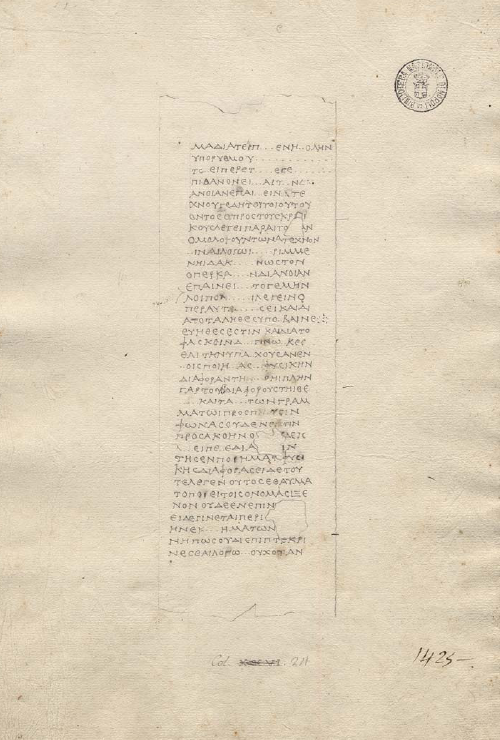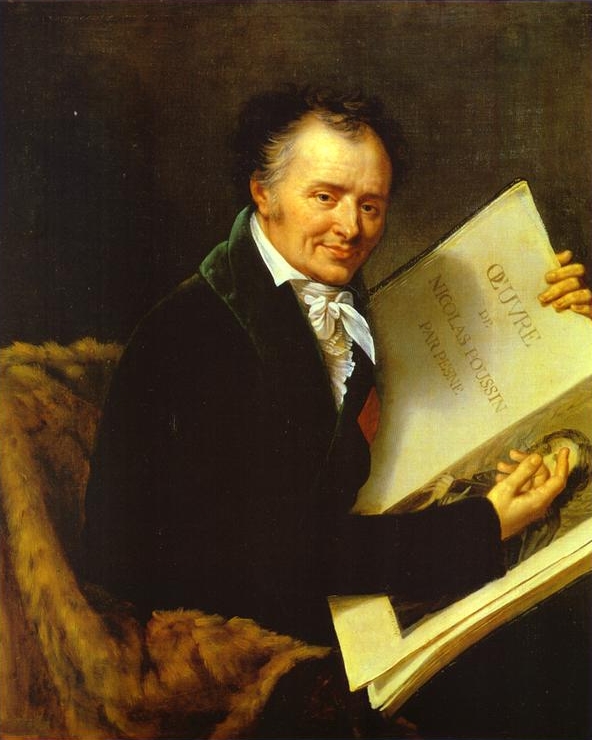|
Herculaneum Papyri
The Herculaneum papyri are more than 1,800 papyri found in the Herculaneum Villa of the Papyri, in the 18th century, carbonized by the eruption of Mount Vesuvius in AD 79. The papyri, containing a number of Greek philosophical texts, come from the only surviving library from antiquity that exists in its entirety.Interview with Daniel Delattre: the Herculaneum scrolls given to Consul Bonaparte (2010), Napoleon.org As many as 44 of the works discovered were written by the philosopher and poet |
Herculaneum Papyrus 1425
Herculaneum (; Neapolitan and it, Ercolano) was an ancient town, located in the modern-day ''comune'' of Ercolano, Campania, Italy. Herculaneum was buried under volcanic ash and pumice in the eruption of Mount Vesuvius in AD 79. Like the nearby city of Pompeii, Herculaneum is famous as one of the few ancient cities to be preserved nearly intact, as the ash that blanketed the town protected it against looting and elements. Although less known than Pompeii today, it was the first, and the only discovered buried Vesuvian city (in 1709) for a long time. Pompeii was revealed only in 1748 and identified in 1763. Unlike Pompeii, the mainly pyroclastic material that covered Herculaneum carbonized and preserved more wood in objects such as roofs, beds, and doors, as well as other organic-based materials such as food and papyrus. According to the traditional tale, the city was rediscovered by chance in 1709, during the drilling of a well. Remnants of the city, however, were alread ... [...More Info...] [...Related Items...] OR: [Wikipedia] [Google] [Baidu] |
Philology
Philology () is the study of language in oral and written historical sources; it is the intersection of textual criticism, literary criticism, history, and linguistics (with especially strong ties to etymology). Philology is also defined as the study of literary texts as well as oral and written records, the establishment of their authenticity and their original form, and the determination of their meaning. A person who pursues this kind of study is known as a philologist. In older usage, especially British, philology is more general, covering comparative and historical linguistics. Classical philology studies classical languages. Classical philology principally originated from the Library of Pergamum and the Library of Alexandria around the fourth century BC, continued by Greeks and Romans throughout the Roman/Byzantine Empire. It was eventually resumed by European scholars of the Renaissance, where it was soon joined by philologies of other European ( Germanic, Celti ... [...More Info...] [...Related Items...] OR: [Wikipedia] [Google] [Baidu] |
Bodleian Library
The Bodleian Library () is the main research library of the University of Oxford, and is one of the oldest libraries in Europe. It derives its name from its founder, Sir Thomas Bodley. With over 13 million printed items, it is the second-largest library in Britain after the British Library. Under the Legal Deposit Libraries Act 2003, it is one of six legal deposit libraries for works published in the United Kingdom, and under Irish law it is entitled to request a copy of each book published in the Republic of Ireland. Known to Oxford scholars as "Bodley" or "the Bod", it operates principally as a reference library and, in general, documents may not be removed from the reading rooms. In 2000, a number of libraries within the University of Oxford were brought together for administrative purposes under the aegis of what was initially known as Oxford University Library Services (OULS), and since 2010 as the Bodleian Libraries, of which the Bodleian Library is the large ... [...More Info...] [...Related Items...] OR: [Wikipedia] [Google] [Baidu] |
George IV Of The United Kingdom
George IV (George Augustus Frederick; 12 August 1762 – 26 June 1830) was King of the United Kingdom of Great Britain and Ireland and King of Hanover from the death of his father, King George III, on 29 January 1820, until his own death ten years later. At the time of his accession to the throne, he was acting as Prince Regent, having done so since 5 February 1811, during his father's final mental illness. George IV was the eldest child of King George III and Queen Charlotte. He led an extravagant lifestyle that contributed to the fashions of the Regency era. He was a patron of new forms of leisure, style and taste. He commissioned John Nash to build the Royal Pavilion in Brighton and remodel Buckingham Palace, and commissioned Jeffry Wyatville to rebuild Windsor Castle. George's charm and culture earned him the title "the first gentleman of England", but his dissolute way of life and poor relationships with his parents and his wife, Caroline of Brunswick, earned ... [...More Info...] [...Related Items...] OR: [Wikipedia] [Google] [Baidu] |
Vivant Denon
Dominique Vivant, Baron Denon (4 January 1747 – 27 April 1825) was a French artist, writer, diplomat, author, and archaeologist. Denon was a diplomat for France under Louis XV and Louis XVI. He was appointed as the first Director of the Louvre museum by Napoleon after the Egyptian campaign of 1798–1801, and is commemorated in the Denon Wing of the modern museum and in the Dominique-Vivant Denon Research Center. His two-volume ''Voyage dans la basse et la haute Egypte'' ("Journey in Lower and Upper Egypt"), 1802, was foundational for modern Egyptology. Birth and name Vivant Denon was born at Chalon-sur-Saône to a family called "de Non", of the "petite noblesse" or gentry, and until the French Revolution signed himself as "le chevalier de Non". Like many of the nobility, he revised his surname at the Revolution to lose the "nobiliary particle" "de". He seems to have consistently avoided using his baptised first name "Dominique", preferring his middle name "Vivant", and ... [...More Info...] [...Related Items...] OR: [Wikipedia] [Google] [Baidu] |





